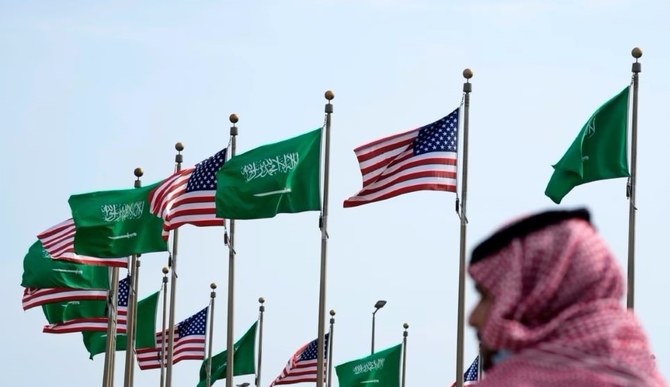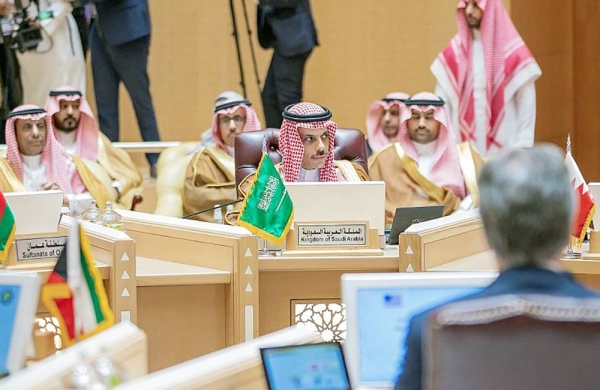
Four joint working groups from the Gulf Cooperation Council and the US met last month to address key security threats to the region: The Iran Working Group, the Counterterrorism Working Group, the Maritime Working Group, and the Integrated Air Defense Working Group. They are part of the framework set up by the two sides several years ago that includes about a dozen standing working groups, plus ad hoc task forces and committees dealing with different aspects of the GCC-US strategic partnership announced at the Camp David summit of May 2015.
The meetings were held in Riyadh on Feb. 13-16 and built on the three summits held in Jeddah last July, when leaders from Saudi Arabia, the GCC, Egypt, Iraq and Jordan met with President Joe Biden to renew their commitment to the region’s security.
At the Riyadh meetings, US officials reaffirmed America’s solid commitment to this region and its security, and to its long-standing partners in the Gulf. Officials from both sides stressed that the US and the GCC share a commitment to expanding multilateral cooperation in order to more effectively address threats to their collective security, and that this shared commitment to addressing the regional security threats of today and tomorrow through expanded cooperation remains critical.
The Iran Working Group meeting attracted probably the most media attention as it came after the near-death, as yet unannounced, of the Joint Comprehensive Plan of Action nuclear deal, which was not mentioned in the media readout after the meeting and was only scantily discussed inside. The JCPOA’s failure notwithstanding, the two sides reiterated privately and publicly that diplomacy remained the preferred way to address Iran’s destabilizing policies and nuclear escalation in a sustained manner. They called on Iran to choose a better alternative than its current one that would contribute to a more secure and stable region and benefit the Iranian people. Despite this clear commitment by the US and GCC partners to diplomacy, Iran blasted the meeting, raising questions about its own commitment to diplomacy.
While diplomacy remains the best choice, GCC and US officials discussed in detail the threats emanating from Iran and how to address them. They condemned its continued destabilizing policies, including its support for terrorism and the use of advanced missiles, drones and cyber weapons, and their proliferation in the region and around the world. Iran and its proxies and partners have used these weapons in attacks striking civilians, critical infrastructure and international maritime shipping. Saudi Arabia alone has been the target of about 1,400 ballistic missile and drone attacks over the past few years.
The working group discussed Tehran’s deepening two-way cooperation with state and nonstate actors, which poses a grave security threat to the region and the entire world. In particular, they condemned its ongoing provision of conventional weapons, advanced missiles and drones to the Houthis, which has prolonged the conflict in Yemen and worsened the humanitarian disaster there.
On the nuclear threat, the US and GCC agreed that Iran’s recent nuclear advances, as documented by the International Atomic Energy Agency, have no credible civilian purpose and only serve to exacerbate regional and global tensions. They called on Iran to immediately reverse course, cease its nuclear provocations, engage in meaningful diplomacy and fully cooperate with the IAEA investigations into particles of nuclear material found at undeclared locations in Iran, consistent with Iran’s safeguard obligations. At the meeting, the US reaffirmed President Biden’s commitment not to allow Iran to acquire a nuclear weapon.
The Counterterrorism Working Group discussed the range of terrorist threats to the Gulf and other regions, including South and Central Asia and Africa. It affirmed that terrorism “should not be associated with any religion, nationality or ethnic group,” in a reference to Islamophobia. The two sides condemned Iran’s proxies such as Hezbollah, as well as those in Iraq, Syria and Yemen. They took Tehran to task for supporting terrorist and other armed groups to conduct hundreds of attacks, threatening the region’s security and stability and causing incalculable damage to its communities.
The GCC and US renewed their commitment to defeating Daesh and preventing its reemergence in Syria and Iraq through the global coalition, including upcoming working and focus group meetings on countering its financing and messaging, deterring foreign terrorist fighter travel, and implementing stabilization lines of effort in Syria and Iraq. To deal with the tens of thousands of former Daesh terrorists and their families who are still stranded in detention facilities in northeast Syria, they called for greater international efforts to deal with those individuals humanely and safely, including through their repatriation to their home countries, rehabilitation, reintegration and prosecution, where appropriate.
There has been considerable success since the US and GCC states established in 2017 a dedicated center in Riyadh to target terrorism financing, the only one of its kind in the world. They celebrated that achievement in Riyadh last month and stressed the importance of strengthening international efforts to disrupt terrorism financing.
The two military working groups on maritime security and integrated air defense expressed the US and GCC member states’ enduring commitment to expanding defense cooperation and interoperability between their forces to enhance their capabilities to constrain Iran’s ability to conduct destabilizing activities and deter it from conducting future acts of aggression. They urged the international community to enforce all relevant UN Security Council resolutions prohibiting transfers of arms and related materiel and ensuring accountability in this regard.
US officials reaffirmed America’s solid commitment to this region and its security, and to its long-standing partners in the Gulf.
Dr. Abdel Aziz Aluwaisheg
Dana Stroul, US deputy assistant secretary of defense for the Middle East, who took part in the meetings, said afterward that the tens of thousands of US forces stationed at many bases across the region offer an important platform for America’s efforts to promote stability across the region. The US made its commitment clear that it will continue to support GCC military integration, a primary goal of the GCC since its establishment in 1981. Both also stressed their solid commitment to multilateral cooperation through the Combined Maritime Forces and its four task forces, as well as other platforms.
The four working group meetings have thus renewed the US and GCC’s shared commitment to the region’s security and put to rest unfounded speculation that this partnership has wavered. By all accounts, threats to regional and global security have multiplied, not waned, as Iran appears to further militarize its foreign policy tools. The GCC-US security partnership will remain a solid piece of the regional security architecture as long as those shared threats persist.
Dr. Abdel Aziz Aluwaisheg is the GCC assistant secretary-general for political affairs and negotiation, and a columnist for Arab News. The views expressed in this piece are personal and do not necessarily represent GCC views. Twitter: @abuhamad1






